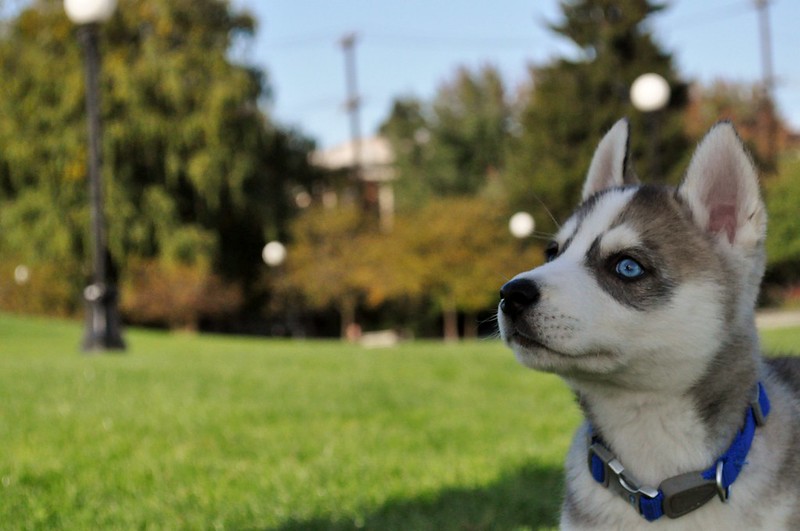What Are Some Facts About Miniature Siberian Husky Puppies?

Miniature Siberian husky puppies look and act just like standard Siberian husky puppies. They’re just a lot smaller (and a lot cuter!). The American Kennel Club doesn’t recognize the adorable pups as an authentic breed, but “mini huskies” have been bred since the 1990s. These friendly dogs make good pets for people who don’t have the space for full-size Siberian huskies but love the breed. Here’s what you need to know before bringing one home.
Size
The average fully grown miniature Siberian husky stands about 14 to 17 inches tall and weighs between 25 and 35 pounds. The way the puppy was bred can impact its final size. The mini husky first appeared when a woman named Bree Normandin chose to breed two smaller Siberian huskies in hopes of achieving a miniature version of the dog. Breeders still use that practice today.
Appearance
Although it may be smaller than the average-size Siberian husky, the miniature husky shares a similar appearance. The standard coat colors are black and white, although some dogs may have brown, gray or silver hair. Standard eye color is typically blue, green, brown, amber or some variety of two or more of these colors. Some of the dogs even have multi-colored eyes. Like their larger counterparts, miniature Siberian huskies look like wolves and are sometimes referred to as “pocket wolves” for this reason.
Temperament
Miniature Siberian huskies are friendly dogs that make great family pets, but they can be mischievous due to their high levels of intelligence and their playful nature. The puppies are high-energy dogs that need plenty of physical activity. It’s not wise to try to keep one contained. They are known for their ability to escape any fence or cage, no matter the size or height. Other problems mini husky owners may encounter are excessive howling and barking, digging and chewing.
Diet and Exercise Needs
Because they are high-energy dogs, mini huskies need daily activity, especially puppies. Ideally, they should live in a home with a yard or with a family that can take them on regular walks throughout the day. Two hours of physical activity per day is ideal. Keep mini huskies out of trouble by providing them with toys and other stimulating activities to enjoy between walks.
When choosing food for a mini husky, skip the kibble meant for smaller breeds and choose one that’s ideal for active dogs. Avoid feeding miniature Siberian huskies too much, as even the most active dogs are prone to obesity. Each dog’s needs are different, but the average mini husky should eat about two cups of kibble per day.
General Health and Lifespan
The average miniature Siberian husky will live to be about 12 to 14 years old. They are generally healthy dogs, but certain genetic issues are sometimes a problem, including various eye diseases that could lead to blindness. Skin issues and hip dysplasia are other common mini husky health problems.
Training
Miniature Siberian huskies are friendly, but they also like to establish dominance within their packs or families. This can make training difficult. The dog’s owner should make it clear that the human is the leader of the household and stick to training methods that use positive reinforcement. It’s also important to hold multiple short training sessions because mini huskies typically have short attention spans.
Grooming Needs
Huskies of all sizes shed frequently, especially during the spring and fall. Dog owners can help prevent shedding by brushing their pets twice a week. Regular brushing also helps keep the dog’s dense coat healthy and attractive. Baths are only necessary about once a month.
Choosing a Miniature Siberian Husky Puppy
Because Siberian husky puppies are friendly and loyal, they make excellent family pets with the right socialization. They typically get along with adults, children and other dogs, but be aware that if they live in a home with cats or other small animals, they may chase them or view them as prey. Training can help curb their instinct to chase small animals.





